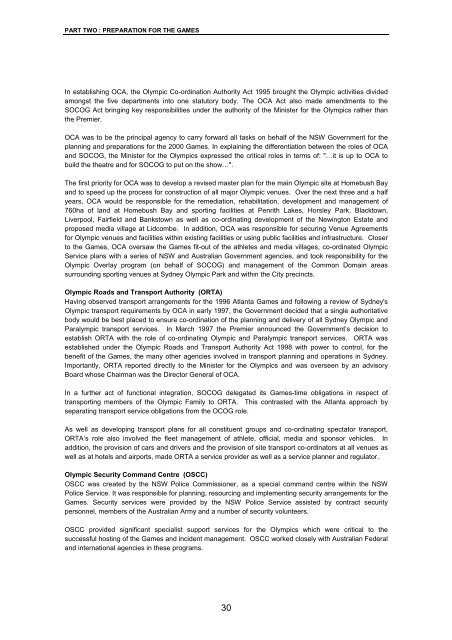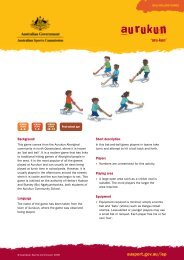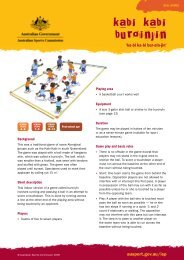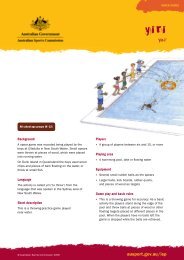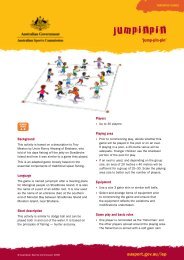the sydney 2000 olympic and paralympic games - Australian Sports ...
the sydney 2000 olympic and paralympic games - Australian Sports ...
the sydney 2000 olympic and paralympic games - Australian Sports ...
You also want an ePaper? Increase the reach of your titles
YUMPU automatically turns print PDFs into web optimized ePapers that Google loves.
PART TWO : PREPARATION FOR THE GAMES<br />
In establishing OCA, <strong>the</strong> Olympic Co-ordination Authority Act 1995 brought <strong>the</strong> Olympic activities divided<br />
amongst <strong>the</strong> five departments into one statutory body. The OCA Act also made amendments to <strong>the</strong><br />
SOCOG Act bringing key responsibilities under <strong>the</strong> authority of <strong>the</strong> Minister for <strong>the</strong> Olympics ra<strong>the</strong>r than<br />
<strong>the</strong> Premier.<br />
OCA was to be <strong>the</strong> principal agency to carry forward all tasks on behalf of <strong>the</strong> NSW Government for <strong>the</strong><br />
planning <strong>and</strong> preparations for <strong>the</strong> <strong>2000</strong> Games. In explaining <strong>the</strong> differentiation between <strong>the</strong> roles of OCA<br />
<strong>and</strong> SOCOG, <strong>the</strong> Minister for <strong>the</strong> Olympics expressed <strong>the</strong> critical roles in terms of: "…it is up to OCA to<br />
build <strong>the</strong> <strong>the</strong>atre <strong>and</strong> for SOCOG to put on <strong>the</strong> show…".<br />
The first priority for OCA was to develop a revised master plan for <strong>the</strong> main Olympic site at Homebush Bay<br />
<strong>and</strong> to speed up <strong>the</strong> process for construction of all major Olympic venues. Over <strong>the</strong> next three <strong>and</strong> a half<br />
years, OCA would be responsible for <strong>the</strong> remediation, rehabilitation, development <strong>and</strong> management of<br />
760ha of l<strong>and</strong> at Homebush Bay <strong>and</strong> sporting facilities at Penrith Lakes, Horsley Park, Blacktown,<br />
Liverpool, Fairfield <strong>and</strong> Bankstown as well as co-ordinating development of <strong>the</strong> Newington Estate <strong>and</strong><br />
proposed media village at Lidcombe. In addition, OCA was responsible for securing Venue Agreements<br />
for Olympic venues <strong>and</strong> facilities within existing facilities or using public facilities <strong>and</strong> infrastructure. Closer<br />
to <strong>the</strong> Games, OCA oversaw <strong>the</strong> Games fit-out of <strong>the</strong> athletes <strong>and</strong> media villages, co-ordinated Olympic<br />
Service plans with a series of NSW <strong>and</strong> <strong>Australian</strong> Government agencies, <strong>and</strong> took responsibility for <strong>the</strong><br />
Olympic Overlay program (on behalf of SOCOG) <strong>and</strong> management of <strong>the</strong> Common Domain areas<br />
surrounding sporting venues at Sydney Olympic Park <strong>and</strong> within <strong>the</strong> City precincts.<br />
Olympic Roads <strong>and</strong> Transport Authority (ORTA)<br />
Having observed transport arrangements for <strong>the</strong> 1996 Atlanta Games <strong>and</strong> following a review of Sydney's<br />
Olympic transport requirements by OCA in early 1997, <strong>the</strong> Government decided that a single authoritative<br />
body would be best placed to ensure co-ordination of <strong>the</strong> planning <strong>and</strong> delivery of all Sydney Olympic <strong>and</strong><br />
Paralympic transport services. In March 1997 <strong>the</strong> Premier announced <strong>the</strong> Government’s decision to<br />
establish ORTA with <strong>the</strong> role of co-ordinating Olympic <strong>and</strong> Paralympic transport services. ORTA was<br />
established under <strong>the</strong> Olympic Roads <strong>and</strong> Transport Authority Act 1998 with power to control, for <strong>the</strong><br />
benefit of <strong>the</strong> Games, <strong>the</strong> many o<strong>the</strong>r agencies involved in transport planning <strong>and</strong> operations in Sydney.<br />
Importantly, ORTA reported directly to <strong>the</strong> Minister for <strong>the</strong> Olympics <strong>and</strong> was overseen by an advisory<br />
Board whose Chairman was <strong>the</strong> Director General of OCA.<br />
In a fur<strong>the</strong>r act of functional integration, SOCOG delegated its Games-time obligations in respect of<br />
transporting members of <strong>the</strong> Olympic Family to ORTA. This contrasted with <strong>the</strong> Atlanta approach by<br />
separating transport service obligations from <strong>the</strong> OCOG role.<br />
As well as developing transport plans for all constituent groups <strong>and</strong> co-ordinating spectator transport,<br />
ORTA’s role also involved <strong>the</strong> fleet management of athlete, official, media <strong>and</strong> sponsor vehicles. In<br />
addition, <strong>the</strong> provision of cars <strong>and</strong> drivers <strong>and</strong> <strong>the</strong> provision of site transport co-ordinators at all venues as<br />
well as at hotels <strong>and</strong> airports, made ORTA a service provider as well as a service planner <strong>and</strong> regulator.<br />
Olympic Security Comm<strong>and</strong> Centre (OSCC)<br />
OSCC was created by <strong>the</strong> NSW Police Commissioner, as a special comm<strong>and</strong> centre within <strong>the</strong> NSW<br />
Police Service. It was responsible for planning, resourcing <strong>and</strong> implementing security arrangements for <strong>the</strong><br />
Games. Security services were provided by <strong>the</strong> NSW Police Service assisted by contract security<br />
personnel, members of <strong>the</strong> <strong>Australian</strong> Army <strong>and</strong> a number of security volunteers.<br />
OSCC provided significant specialist support services for <strong>the</strong> Olympics which were critical to <strong>the</strong><br />
successful hosting of <strong>the</strong> Games <strong>and</strong> incident management. OSCC worked closely with <strong>Australian</strong> Federal<br />
<strong>and</strong> international agencies in <strong>the</strong>se programs.<br />
30


